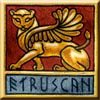
Losna is the Etruscan Goddess of the moon, equivalent to the Roman Luna, and indeed the Etruscan and Latin words are quite alike. One of the Etruscan words for moon is lusxnei, and similar words in Latin related to luna, "moon" are lucidus "shining, clear", luscus "lucid, twilight", and even lustratio "purification by sacrifice". The Etruscan and Latin words are intertwined closely enough that it is not clear if "Losna" is a proper Etruscan word or an archaic Latin word. At any rate, Losna is depicted on one mirror-back from Praeneste with the boy Amukes (whose name means "Eternal" in Etruscan and who is the equivalent of the Greek Amykos) and the rather muscle-bound yet stringy Polokes (Latin Pollux, Greek Polydeukes, one of the Dioscuri, who was associated in Etruscan and Greek legend with the morning star). She stands in the center of the mirror and is taller than Polokes; Amukes sits before Her on a low bench. Both boys have their hands and wrists bound in thongs as if about to engage in a boxing match, and over this scene Losna presides. She leans on the staff She holds in Her left hand, with Her right hand on Her hip, and a slim waning crescent moon hangs before Her face. In the Greek myth, Amykos was the King of the Bebryces, who challenged all who came his way to a boxing match. If they refused to fight, he threw them in the ocean; if they took him on, Amykos invariably won and killed his opponent. Polydeukes, as one of the Argonauts, accepted his challenge and won, killing Amykos instead. It is not known what part Losna as the moon Goddess plays in this legend, but the mirror-back evidently has a celestial theme, as both Polokes and Losna have connections to heavenly bodies of light: Losna as the moon, of course, and Polokes as the Morning Star; His brother Castor was the evening star, and the two of them formed the constellation Gemini. There was an Etruscan city called Luna, in the northwestern part of Etruria on the River Macra, right on the border with Liguria. The city itself was not very big, but it had an excellent large port that opened out onto the Gulf of Spezia, and the surrounding landscape was famous for its drama and beauty. The Romans in writing about it were quite clear that they believed it to be a very ancient city of the Etruscans; however in modern times no Etruscan remains have been found there, and the city and any traces of it have almost completely vanished. In Roman times it was noted for its excellent wine and cheeses, which were stamped with a crescent moon or the figure of the Moon-Goddess, the Etruscan version of Diana, Losna. That Luna the city was named after Losna/Luna the Moon-Goddess is only one of several possibilities: the port itself was crescent-shaped, and that could have given the city its name, or luna may be an Etruscan word meaning "port", as evidenced in the Etruscan city-names Pupluna (in Latin Populonia) and Vetluna (the Latin Vetulonia), which would make the name Luna simply mean "Port", named after what was the most obvious feature of the location. The Greeks however did translate the name of the city as Selene, the name of their moon Goddess. She is associated with the Roman moon and light Goddesses Luna and Diana. Alternate spellings: Lusna (perhaps the original form of Her name), Lucna, Louna, Lala. Losna may be the form of Her name in the dialect of Praeneste (Latin Palestrina). |
|
|



